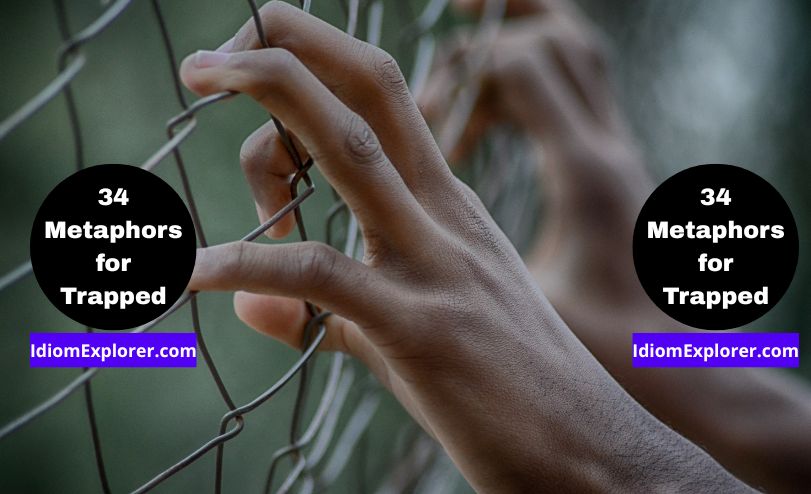Feeling trapped is a deeply human experience, one that can weigh heavily on our hearts and minds. Whether it’s the suffocating grip of a toxic relationship, the relentless pressure of a dead-end job, or the quiet despair of our own thoughts, the sensation of being stuck resonates universally.
Metaphors give us a way to name this feeling, to wrap it in words that make it tangible and relatable. Below, I’ve explored 34 unique metaphors for being trapped, each with its meaning, an example sentence, and alternative ways to express it.
My hope is that these metaphors not only help you articulate your own experiences but also remind you that you’re not alone in feeling this way.
34 Metaphors for Being Trapped
1. Caught in a Spider’s Web
Meaning: This metaphor evokes the image of being entangled in a delicate but inescapable network, struggling to break free as the situation tightens around you.
Example Sentence: Trying to escape her overwhelming responsibilities felt like being caught in a spider’s web, each move only binding her tighter.
Alternative Ways of Saying It:
- Tangled in a net.
- Snared in a trap.
- Enmeshed in a lattice.
2. Locked in a Cage
Meaning: Suggests confinement in a small, restrictive space with no apparent way out, emphasizing loss of freedom.
Example Sentence: His fear of failure kept him locked in a cage, unable to pursue his dreams.
Alternative Ways of Saying It:
- Imprisoned in a cell.
- Confined in a pen.
- Trapped in a box.
3. Drowning in Quicksand
Meaning: Describes a situation where the more you struggle, the deeper you sink, highlighting futility and panic.
Example Sentence: The harder she worked to fix her finances, the more she felt like she was drowning in quicksand.
Alternative Ways of Saying It:
- Sinking in mud.
- Swallowed by a bog.
- Engulfed in a mire.
4. Chained to a Boulder
Meaning: Implies being weighed down by an immovable burden that prevents progress.
Example Sentence: His guilt was like being chained to a boulder, dragging him back with every step.
Alternative Ways of Saying It:
- Shackled to a weight.
- Bound to an anchor.
- Tethered to a stone.
5. Stuck in a Maze
Meaning: Represents confusion and disorientation, with endless paths leading to dead ends.
Example Sentence: Navigating her toxic workplace felt like being stuck in a maze with no exit in sight.
Alternative Ways of Saying It:
- Lost in a labyrinth.
- Trapped in a puzzle.
- Caught in a riddle.
6. Buried Alive
Meaning: Conveys the terror of being trapped in a suffocating, hopeless situation with no escape.
Example Sentence: The weight of her grief left her feeling buried alive, gasping for relief.
Alternative Ways of Saying It:
- Entombed in despair.
- Smothered under rubble.
- Trapped beneath the earth.
7. Caught in a Vise
Meaning: Suggests intense pressure squeezing from all sides, leaving no room to move.
Example Sentence: The expectations of his family held him in a vise, crushing his individuality.
Alternative Ways of Saying It:
- Squeezed in a clamp.
- Crushed in a grip.
- Pressed in a vice.
8. Trapped in a Bottle
Meaning: Evokes a sense of being confined in a transparent but unbreakable container, visible yet isolated.
Example Sentence: Her anxiety kept her trapped in a bottle, watching the world move on without her.
Alternative Ways of Saying It:
- Sealed in a jar.
- Encased in glass.
- Confined in a flask.
9. Bound by Invisible Threads
Meaning: Describes subtle, unseen forces that restrict freedom, like societal norms or expectations.
Example Sentence: She felt bound by invisible threads, unable to defy her community’s traditions.
Alternative Ways of Saying It:
- Tied by unseen strings.
- Held by ghostly ropes.
- Snared by intangible bonds.
10. Frozen in Amber
Meaning: Suggests being preserved in a moment or situation, unable to move forward in time.
Example Sentence: His obsession with the past left him frozen in amber, reliving old mistakes.
Alternative Ways of Saying It:
- Trapped in time.
- Encased in resin.
- Stuck in a fossil.
11. Caught in a Whirlpool
Meaning: Represents being pulled into a spiraling, uncontrollable situation that drags you deeper.
Example Sentence: The chaos of his addiction felt like being caught in a whirlpool, powerless to escape.
Alternative Ways of Saying It:
- Sucked into a vortex.
- Dragged by a current.
- Swirled in an eddy.
12. Shackled by Shadows
Meaning: Implies being restrained by fears or doubts that loom darkly but lack substance.
Example Sentence: Her insecurities kept her shackled by shadows, unable to step into the light.
Alternative Ways of Saying It:
- Bound by phantoms.
- Chained by ghosts.
- Held by specters.
13. Trapped in a Snow Globe
Meaning: Suggests a picturesque but artificial confinement, where everything feels repetitive and staged.
Example Sentence: Living in her small town felt like being trapped in a snow globe, beautiful but unchanging.
Alternative Ways of Saying It:
- Confined in a diorama.
- Stuck in a bubble.
- Encased in a scene.
14. Caught in a Bear Trap

Meaning: Describes a sudden, painful entrapment that causes damage the more you try to escape.
Example Sentence: His toxic relationship was like being caught in a bear trap, every move drawing blood.
Alternative Ways of Saying It:
- Snared in a clamp.
- Trapped in a jaw.
- Caught in a snare.
15. Walled in by Bricks
Meaning: Evokes the image of being surrounded by solid, immovable barriers, emphasizing isolation.
Example Sentence: Her depression left her walled in by bricks, cut off from joy.
Alternative Ways of Saying It:
- Enclosed by stone.
- Blocked by concrete.
- Sealed by masonry.
16. Tangled in Vines
Meaning: Suggests being ensnared by organic, creeping obstacles that grow tighter over time.
Example Sentence: The demands of her job left her tangled in vines, unable to break free.
Alternative Ways of Saying It:
- Ensnared by ivy.
- Caught in brambles.
- Trapped in tendrils.
17. Caged in a Gilded Prison
Meaning: Describes a luxurious but restrictive environment where freedom is sacrificed for comfort.
Example Sentence: Her wealth kept her caged in a gilded prison, surrounded by opulence but lonely.
Alternative Ways of Saying It:
- Trapped in a golden cage.
- Confined in a plush cell.
- Imprisoned in luxury.
18. Caught in a Flytrap
Meaning: Implies being lured into a trap by something enticing, only to find escape impossible.
Example Sentence: The promise of fame left him caught in a flytrap, unable to reclaim his privacy.
Alternative Ways of Saying It:
- Snared by a lure.
- Trapped by bait.
- Caught in a sticky trap.
19. Stranded on an Island
Meaning: Suggests isolation and abandonment, with no means of escape or connection.
Example Sentence: After the breakup, she felt stranded on an island, cut off from support.
Alternative Ways of Saying It:
- Marooned on a rock.
- Isolated on a reef.
- Abandoned on a shore.
20. Trapped in a Time Loop
Meaning: Describes the repetitive, unchanging nature of a situation, like reliving the same day.
Example Sentence: His monotonous job felt like being trapped in a time loop, each day identical.
Alternative Ways of Saying It:
- Stuck in a cycle.
- Caught in a loop.
- Reliving the same moment.
21. Ensnared in a Noose
Meaning: Evokes the image of a tightening rope, suggesting danger and impending doom.
Example Sentence: The pressure to succeed left him ensnared in a noose, choking his creativity.
Alternative Ways of Saying It:
- Caught in a rope.
- Trapped in a lasso.
- Bound by a cord.
22. Locked in a Vault
Meaning: Suggests being sealed in a secure, impenetrable space, emphasizing isolation and safety at the cost of freedom.
Example Sentence: Her fear of vulnerability kept her locked in a vault, safe but alone.
Alternative Ways of Saying It:
- Sealed in a safe.
- Confined in a bunker.
- Trapped in a strongbox.
23. Caught in a Riptide
Meaning: Describes being pulled away by a powerful, uncontrollable force, despite efforts to resist.
Example Sentence: The stress of his responsibilities dragged him like a riptide, far from calm waters.
Alternative Ways of Saying It:
- Swept by a current.
- Dragged by a tide.
- Pulled by an undertow.
24. Trapped in a Fishbowl
Meaning: Suggests being exposed and confined in a small, transparent space, with no privacy.
Example Sentence: Living under public scrutiny felt like being trapped in a fishbowl, always on display.
Alternative Ways of Saying It:
- Confined in a bowl.
- Exposed in a tank.
- Trapped in a globe.
25. Bound in a Straitjacket
Meaning: Implies being restrained to the point of helplessness, often associated with mental or emotional confinement.
Example Sentence: Her anxiety wrapped her in a straitjacket, stifling her ability to act.
Alternative Ways of Saying It:
- Tied in restraints.
- Bound in a harness.
- Shackled in bonds.
26. Caught in a Sandstorm
Meaning: Describes being overwhelmed by chaotic, blinding forces that disorient and trap you.
Example Sentence: The flurry of deadlines left her caught in a sandstorm, unable to see a way out.
Alternative Ways of Saying It:
- Lost in a dust storm.
- Trapped in a blizzard.
- Engulfed in a tempest.
27. Trapped in a Cocoon
Meaning: Suggests being wrapped in a protective but restrictive layer, preventing growth or movement.
Example Sentence: Her fear of change kept her trapped in a cocoon, unable to spread her wings.
Alternative Ways of Saying It:
- Wrapped in a chrysalis.
- Enclosed in a shell.
- Confined in a pod.
28. Caught in a Glue Trap
Meaning: Implies being stuck in a sticky, inescapable situation that holds you fast.
Example Sentence: The toxic friendship was like being caught in a glueFiled under:
- Stuck in a sticky mess.
- Trapped in adhesive.
- Snared in a tacky bind.
29. Buried in an Avalanche
Meaning: Describes being overwhelmed and crushed by a sudden, massive force, like responsibilities or emotions.
Example Sentence: The sudden loss of her job left her buried in an avalanche of fear and uncertainty.
Alternative Ways of Saying It:
- Crushed by a landslide.
- Overwhelmed by a deluge.
- Smothered by a flood.
30. Trapped in a Pinata
Meaning: Suggests being battered from all sides, vulnerable and unable to escape external pressures.
Example Sentence: Facing criticism from every angle, she felt trapped in a pinata, bruised and broken.
Alternative Ways of Saying It:
- Caught in a punching bag.
- Trapped in a target.
- Battered in a fray.
31. Caught in a Minefield
Meaning: Describes a dangerous, unpredictable situation where every step risks disaster.
Example Sentence: Navigating office politics was like being caught in a minefield, every word a potential explosion.
Alternative Ways of Saying It:
- Trapped in a danger zone.
- Caught in a trapfield.
- Stuck in a peril patch.
32. Locked in a Pressure Cooker
Meaning: Suggests intense, escalating pressure in a confined space, with no release.
Example Sentence: The stress of exams had her locked in a pressure cooker, ready to burst.
Alternative Ways of Saying It:
- Trapped in a boiler.
- Confined in a crucible.
- Sealed in a cauldron.
33. Caught in a Tourniquet
Meaning: Implies a tightening restriction that cuts off vitality, like resources or energy.
Example Sentence: Budget cuts left the team caught in a tourniquet, unable to function effectively.
Alternative Ways of Saying It:
- Choked by a ligature.
- Strangled by a band.
- Squeezed by a clamp.
34. Trapped in a Kaleidoscope
Meaning: Describes a disorienting, ever-shifting situation that traps you in confusion.
Example Sentence: The constant changes in her life left her trapped in a kaleidoscope, dizzy and lost.
Alternative Ways of Saying It:
- Caught in a prism.
- Stuck in a whirl.
- Trapped in a spin.
Metaphors for Being Trapped Quiz

Metaphors for Being Trapped Quiz
Your Results
Review Answers
You may also like:
Why Metaphors Matter
Metaphors are more than poetic flourishes; they’re tools for understanding. When we say we’re “caught in a spider’s web” or “locked in a cage,” we’re not just describing a feeling; we’re giving it shape, making it something we can visualize and share.
These metaphors can foster empathy, helping others grasp the weight of our experiences. They also remind us that feeling trapped is a shared human struggle, one that countless others have navigated and overcome.
If you’re feeling trapped, know that naming the feeling is a first step. Try using one of these metaphors to journal about your experience or share it with a trusted friend. Sometimes, putting words to the cage helps you find the key.
